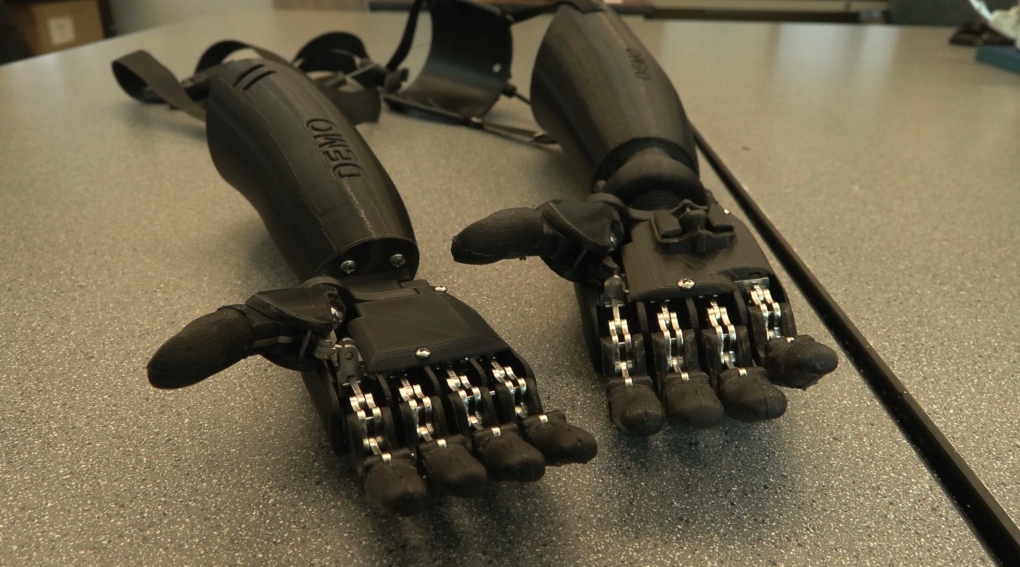Victoria Hand Project looking to produce prosthetics for people injured in Ukraine war
 The prosthetic arms are able to open and close through shoulder movements. (CTV)
The prosthetic arms are able to open and close through shoulder movements. (CTV)
Inside the engineering lab wing at the University of Victoria is a team of engineers working to make a difference in developing countries. The Canadian charity is called the Victoria Hand Project.
“(We're a group) that designs and deploys 3D-printed prosthetic arms,” said Michael Peirone, CEO of the Victoria Hand Project.
The prosthetic arms are able to open and close through shoulder movements.
“The reason why we use body-powered devices is that it keeps the costs much lower,” said Peirone.
The cost is roughly $300 to produce a device to help a person in need of prosthetics in one of the eight countries where the hand project currently operates.
Peirone said the ongoing war in Ukraine has the charity looking to add a ninth country to its list.
Dramatic injuries to both soldiers and citizens in Ukraine are happening daily.
“Earlier today, I was speaking to another group that is helping in the region and they said that it could be around 10,000 people that need prosthetic limbs,” said Peirone.
The engineering of the arms happens on the UVic campus. The printers and materials are sent to the different countries for manufacturing, creating jobs and allowing local clinicians to properly fit the arms.
The charity is now looking for contacts in Ukraine that will help it to establish an operation in that country.
“It’s very rewarding to have worked on a project and see it have an impact on peoples lives,” said Kim Arklie, lab researcher with Biomedical Systems Design Lab and the University of Victoria.
Arklie helped design the hands. She has seen the impact that a prosthetic arm can have on someone’s life.
“I think getting into Ukraine will make a significant difference in people's lives there and give them the opportunity to have low-cost prosthetic care,” she said.
CTVNews.ca Top Stories

NEW After hearing thousands of last words, this hospital chaplain has advice for the living
Hospital chaplain J.S. Park opens up about death, grief and hearing thousands of last words, and shares his advice for the living.
BREAKING Police cordon off Iran consulate in Paris where man threatens to blow himself up: French media
French police cordoned off the Iranian consulate in Paris on Friday, where a man was threatening to blow himself up, Europe 1 radio and BFM TV.
Some Canadian families will receive up to $620 per child today
More money will land in the pockets of some Canadian families on Friday for the latest Canada Child Benefit installment.
BREAKING Iran fires at apparent Israeli attack drones near Isfahan air base and nuclear site
An apparent Israeli drone attack on Iran saw troops fire air defences at a major air base and a nuclear site early Friday morning near the central city of Isfahan, an assault coming in retaliation for Tehran's unprecedented drone-and-missile assault on the country.
American millionaire Jonathan Lehrer denied bail after being charged with killing Canadian couple
American millionaire Jonathan Lehrer, one of two men charged in the killings of a Canadian couple in Dominica, has been denied bail.
Ottawa to force banks to call carbon rebate a carbon rebate in direct deposits
Canadian banks that refuse to identify the carbon rebate by name when doing direct deposits are forcing the government to change the law to make them do it, says Environment Minister Steven Guilbeault.
Ontario woman loses $15,000 to fake Walmart job scam
A woman who recently moved to Canada from India was searching for a job when she got caught in an online job scam and lost $15,000.
After COVID, WHO defines disease spread 'through air'
The World Health Organization and around 500 experts have agreed for the first time on what it means for a disease to spread through the air, in a bid to avoid the confusion early in the COVID-19 pandemic that some scientists have said cost lives.
Prince Harry formally confirms he is now a U.S. resident
Prince Harry, the son of King Charles III and fifth in line to the British throne, has formally confirmed he is now a U.S. resident.
































